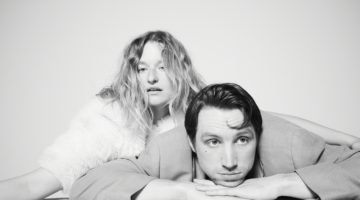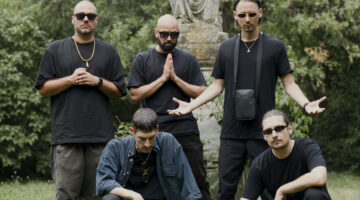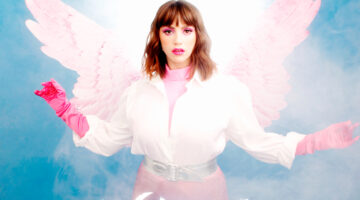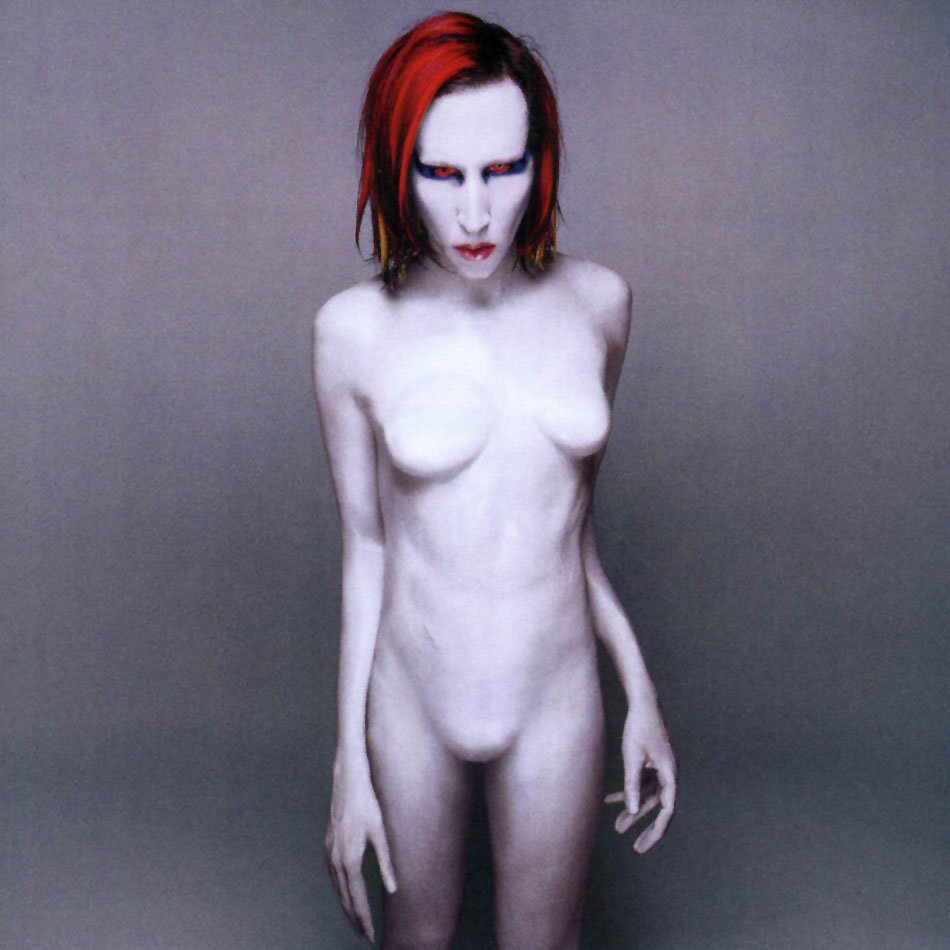After the enormous success of the Antichrist Superstar album, Marilyn Manson toured, wrote his autobiography Long Hard Road Out Of Hell and contended with countless media attacks and law suits. Somehow he also managed to put togehter the stellar new album Mechanical animals revealing a new glittery, glam-rock image – to the surprise of critics and fans alike.
Ever inured to stress and turmoil, not even the recent switch in Manson’s ever changing lin-up seemed to phase him. Guitarist Zim Zum, the latest of the Manson family to leave (that is, be fired) claimed he’s not in the mood to tour another 18 months with Manson: “for me ist was a creative prison!” Manson claimed, however, that ZimZum didn’t show up for work because “he got wrapped up in the whole Hollywood thing.” Zim Zum’s current replacement is John Lowery, former David Lee Roth and Two guitarist.
Despite the roller-coaster line-up, Manson (aka Brian Warner) and bassist Twiggy Ramirez remain not only close buddies who share a house in LA, but the main creative force behind the band. Onstage, the show revolves around the duo infernal, while the other band members hold mere guest roles. Perhaps, as a result, the number of ex-band members has been growing like a weed: before ZimZum ist was Gidget Gein, Daisy Berkowitz and Sarah Lee Lucas who packed it in.
Surprisingly, the personnel changes do not appear to be a matter of personality clashes or egos (Manson’s far from an egomaniac) as much as the inability to withstand the pressure and hard work: long, draining tours, fanatic Mansonites, and furious – often vicious – propaganda. The hysteria surrounding the band seems maddening and yet Manson remains as calm and pleasant as ever…
How do you cope with the pressure of the press, your fans and enemies?
MM: It has to be your lifestyle. You have to live it and can’t just pretend that you live it. If you’re not really into it and believe less than 100% in what you do, then it’s impossible. We’re not a freak show where you put on a mask and the rest of your time you live a nice suburban lifestyle. You have to feel, breathe and live it. If you’re not 100% in it, then you create a monster that comes back to haunt you.
What happened between you and your old friend Trent Reznor? You don’t seem to be on such great terms anymore?
MM: Since the book [Long Hard Road Out of Hell] was publishes I didn’t hear from him. Maybe he’s pissed off. So what? I’m not going to back off and claim that I didn’t mean what I wrote. I’m still behind it all. Anyway, it was time to free myself. I had to step out of his shadow. His word as a producer was very important and it was really great but at the same time he really limited me and I had to break out.
Weren’t you one of the first journalists who interviewed him? What was that like?
MM: Actually it wasn’t so exciting but we got on well. He’s pretty different from Anthony Kiedis [Red Hot Chili Peppers]. I interviewed him a couple of times and he always was an asshole, or at least he acted like one. I might dedicate “The Dope Show” to him: “They love you when you’re on all the covers. When you’re not they love another…”. Sums up the music biz pretty well…It’s a pretty cold and sarcastic song and he’s playing with all the cliches of a decadent musician or rock star. It’s a hymn for the modern rock star, or for Anthony Kiedis.
What about Michael Stipe? Still checking into hotels under his name?
MM: Oh God, no. I don’t anymore. Ha ha ha, I grew really bored with it, but it was a lot of fun.
I never really undestood why you did it anyway.
MM: That’s really simple. Michael was calling me a lot. He kept calling me and I just decided I needed to shake him up a bit. You know he takes everything far too seriously. He needed to ease up. I liked the idea that whenever he called the hotels and wanted to talk to me he had to ask for himself. That’s pretty hilarious, isn’t it? I just can’t resist it. I need to shake people up, need to make them see the funny side and stop them from taking everything so seriously – especially themselves.
Your looks have changed and in Mechanical Animals you sound like a different person from the one who recorded Antichrist Superstar…
MM: I guess you’re right, Antichrist Superstar was something like an act, a role I played. I had to play to be able to deal with my own hatred and the hatred of others. On Mechanical Animals I had to get away from it. I wanted to be somebody else.
There are obvious traces of Bauhaus especially in a few of the songs like the title track “Mechanical Animals”, “the Last Day On Earth” and “Disassociative”…
MM: That’s right and I won’t even try to deny it. Why should I? It is obvious and I don’t have a problem with it. The 80s weren’t bad, they weren’t bad at all. Nothing happened afterwards except grunge.
Your music and your lyrics have really changed…
MM: I think in the past our music was lacking feelings. It was harsh but not melodic and that was ok. It was suitable, but this album is far more personal. It’s more vulnerable. The music and the lyrics have to go together so the music had to follow the lyrics, otherwise it wouldn’t have worked at all. What I really like about the album is that it will schut up a couple of critics, all the guys who claimed we’re just shock rockers without talent will be rather quiet or they might end up looking like fools. I think we shocked them with this album. How’s that for shock rock.
So Mechanical Animals is the beginning of a new era?
MM: That’s for sure. For me, Antichrist Superstar was kind of an experiment, a study. A study about the abuse of power, how power can be abused in politics, religion, music. The whole thing about it was to put your emotions aside and become as powerful, as mighty as possible. To leave your feelings outside.
The experience was successful and now?
MM: And now it’s another experiment: What happens when you get your feelings back?
I don’t know, you tell me?
MM: It’s like beeing on another planet, in another universe, in an atmosphere you don’t belong to. Well, actually Hollywood is ideal for that.
Because the poeple there are form another planet?
MM: Ha ha ha, that too. But what I meant was more the view from my house at night. I’m living in the hills and when I look down at night I see all the bright city lights and the lonliness out there. It’s like being in outer space.
How long are you going to be the American nightmare?
MM: Hey honey, I just started! This is only the beginning of the true nightmare, ha ha ha.
I’m afraid to ask what that means…
MM: I’m an entertainer. There’s nothing I enjoy more than making statements with my performance. My show is giong to become far more extreme – more extreme than you can imagine.
It’s not that you were boring before…
MM: And it’s my aim, my goal, never to be boring.
You’re really looking for trouble, aren’t you?
MM: I just enjoyed the whole confusion my last show created. The majority didn’t understand it at all and it set their little brains in motion. Thinking is something that most Americans have forgotten how to do. That’s a reason why I absolutely have to go on.
How do you view your future?
MM: Oh, maybe I’ll end up in Las Vegas as a crooner, like Frank Sinatra, singing easy listening versions of “The Beautiful People”. That would be fun. On the other hand, I might end up in jail or in the electric chair. I haven’t got a clue. Life is full of surprises.













No Comment